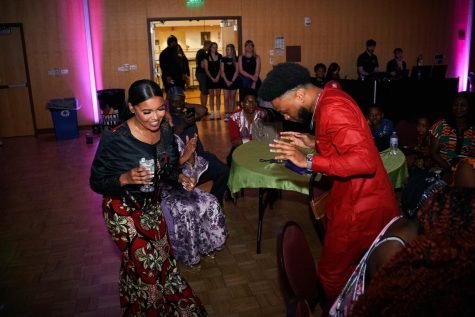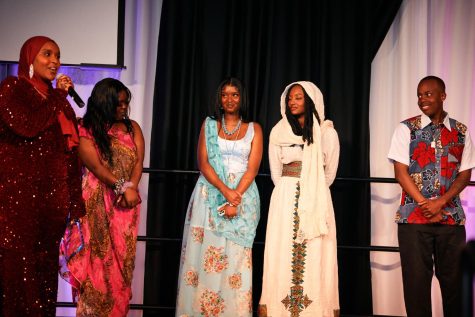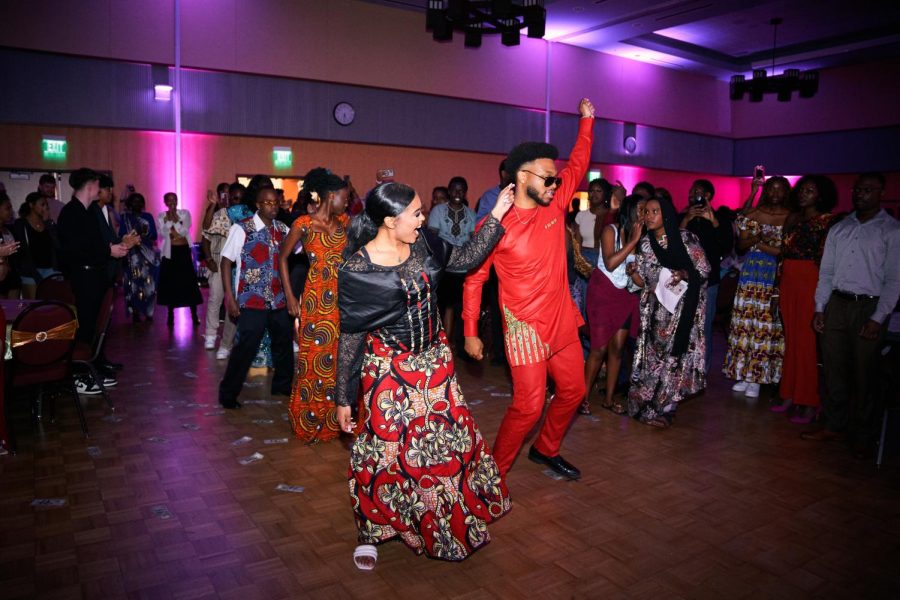ASA highlights African weddings for annual African Night
May 17, 2023
African Night showcased cultural foods and dances to display what a traditional African wedding can look like in the SURC Ballroom on May 13. The event, staged like a big wedding, was put on by CWU ASA (African Student Association).
According to Atong Miyar, who is a junior business administration major, there were many countries represented at African Night including Nigeria, Central Africa, Congo, Guinea, Zambia, South Sudan and many more.
Miyar is on the board for ASA and explained that this year’s African Night was more intensive than last year’s.
“For us, African night has always been an event for us to showcase [African culture] at its height,” Miyar said. “Last year, we [did] African night and we had titled it to be welcoming people into our culture. This year, we are doing a fake African wedding. We’re going deeper into African culture, wedding[s are] a huge part of our traditions.”

According to Miyar, African culture can be “demonetized,” or lose its value and not be understood, so the goal of African night is to have a way to express and fully showcase how beautiful their culture is. Miyar said the theme of the event makes people from the African continent proud of their culture.
“[We] usually don’t see our culture being expressed as much, even if you were born in America and you are someone from Africa, you usually don’t see your culture being as represented within the media,” Miyar said. “I feel like this gives them a form of representation on their school campus and to know that they [can] feel comfortable.”
According to Miyar, in order for this event to happen, it usually takes a lot of planning, like making reservations for the SURC ballroom in order to have a venue.
“African Night planning takes months and months of planning, so we usually [begin] in fall quarter… it takes 5-6 months of planning,” Miyar said.
Anthony Makuma, who majors in aviation management, is from Congo and he explained how he enjoyed the event and that there was a lot to learn from the culture in other parts of Africa as well as his own culture.
“The event was amazing because it was a mix of different cultures and a mix of different countries,” Makuma said. “Learning of the culture’s work, learning to dance to the music, that was amazing. It was special because [there were] different ethnic songs that we played, and we’re able to perform different dances that we have back in Congo.”
Jeremy Mumba, who is a part of the Bemba culture in southern Zambia, said that this event showed individual cultures from Africa and how they all relate to one another.
“We’re all Africa,” Mumba said. “I think it’s a strong reflection of our culture. Africa is a very big continent, many countries, but we’re all, in a sense, one. We’re united by the fact that we’re all African. We’re proud to be African.”
Both Mumba and Makuma reflected on how African Night represented their countries and what it meant for them to see the togetherness that African people bring.
“[My family] might [leave] with something new in their mind[s] because it wasn’t only Congolese people represented, but it was people from different countries. Different countries, different dances, different music, it was a bigger representation,” Makuma said.

Mumba said that ASA has brought a sense of community to him.
“You know, we have our differences sometimes, but we love each other,” Mumba said. “We care for each other. We’re a community. The community part is what I appreciate the most from ASA.”
After the event had ended, Miyar said she felt that everyone gave their all into African Night and she was appreciative of everyone who had contributed to the work.
According to Miyar, the event showcased African culture in as many ways as possible, and it gave a great perspective on what African culture is all about.
“When it comes to dances or when it comes to fashion, you can see the diversity within whatever country that was being presented at the moment. In that aspect, we did a pretty great job,” Miyar said.
According to Miyar, who is South Sudanese, she described how much she loves the community of her culture and what it is like to be from South Sudan.
“I love the community…of my culture, [we] tend to take care of each other,” Miyar said.
Miyar had also stated that she is looking to expand the diversity of African culture representation at CWU and continue expressing those cultures at next year’s event.

